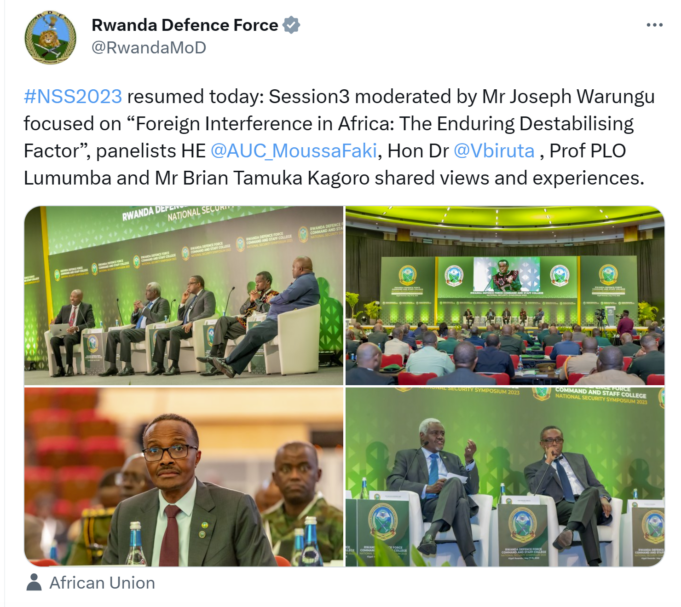For many reasons, it’s seldom that African leaders allow non-military influencers to speak to their military. However, in 1986 while traveling in Ghana, the Honorable Minister Louis Farrakhan of the Nation of Islam was asked by Jerry John Rawlings—the air force officer turned Ghanian President—to address his military. The Minister later said how “unusual” that was.

Fast forward to May 18, 2023, at the 10th National Security Symposium jointly organized by the Rwanda Defense Force Command and Staff College and the University of Rwanda. Rwanda’s president, Paul Kagame—as President Rawlings before him—must have felt quite secure in his position as head of state to allow outspoken, no-holds-barred, pan-Africanist professor PLO Lumumba, to sit on a panel and address his military. He spoke on the theme: “There is a new scramble for Africa.” Professor Lumumba noted “Foreign interference in Africa” is “the enduring destabilizing factor.”
The professor, whose full name is Patrick Loch Otieno Lumumba, was born in Kenya and has a Ph.D. in law, from the University of Ghent in Belgium. He is the founder of the PLO Lumumba Foundation and a consultant with Lumumba and Lumumba Advocates, as well as a member of the Africa Justice Group.
Addressing the symposium, Lumumba said to the officers seated in front of him that even through a combination of certain realities and agitation Africa regained independence. He also referenced Black American historian John Henrik Clarke. “We regained independence by mimicking European governance systems. And he (Clarke) rightly said, ‘No African country will ever succeed on the basis of those systems after that new colonial project was instituted,’” Lumumba said.
Then, taking a page out of Kwame Nkrumah’s historic 1965 book, “Neo-Colonialism: The Last Stage Of Imperialism,” Lumumba explained, “The idea says (this stage is) the most dangerous. We are now in a neocolonial stage, when the European (and American) powers are at their most diabolical.” He added that African military personnel receive military leadership training, from among other places, at the United Kingdom’s Royal Military Academy Sandhurst and U.S. West Point. He said at these institutions “they affect your mind.”
According to Nkrumah’s book, historically “neocolonialism is based upon the control of nominally independent States by giant financial interests.” Nkrumah, Ghana’s first African post-colonial head of state and a founding member of the Organization of African Unity (OAU), added, “An older type of neocolonialism … is based primarily on military considerations.”
The U.S. and France’s military presence in Africa has been sacrosanct. “If the base can be situated in a country which is so constituted economically that it cannot survive without substantial ‘aid’ from the military power which owns the base then, the security of the base can be assured,” Nkrumah wrote.
It has been argued that being a global economic power is no longer necessary if you are the world’s gendarme, or policeman. Looking at the U.S. and its ever-increasing global military presence—including NATO and U.S. Africa Command (Africom), the world’s largest distributor of corporate-manufactured weapons of mass destruction—is looking at military might as more important than economic strength.
Serving as a global cop on the beat gives the U.S. Department of Defense the ability to interfere in African nations in the name of uprooting perceived present and future dangers. And with African nation-states complicit in this neocolonial arrangement, through training and military operations, the U.S. presence can only increase.
A case in point is the 2022 signing of an order by U.S. President Joe Biden authorizing the military to deploy Special Operations forces inside Somalia.
Lumumba also pointed out, European and American ambassadors “treat our heads of state in a condescending manner.”
Not having to look far, without evidence in April, Reuben Brigety, the U.S. ambassador to South Africa, accused the South African government of selling weapons to Russia. Brigety, whose assertion went viral, including being noted on the front page of the London-based Financial Times, later apologized for his statement without saying it was false, and without sharing the source of his accusation.
Also, during Lumumba’s presentation, he pointed to interference by institutions like the International Monetary Fund (IMF) and the World Bank. “They interfere by ensuring that our economic infrastructure is beholden to them, through dollarization.”
According to Senegalese development economist Dr. Ndongo Sylla, “African nations are rich in resources yet remain impoverished due to onerous IMF (International Monetary Fund) and World Bank loan policies and capital flight.”
For the IMF, World Bank, and “creditor nations,” debt “restructuring” is conditional on continuing such plunder. African countries’ worsening foreign indebtedness is partly due to lack of control over export earnings controlled by TNCs (Transnational Corporations), with African elite support.
Mineral and natural resource-rich Africa is not inherently poor. “Rather, it has been impoverished by fraud and pillage leading to resource transfers abroad. An earnest effort to end this requires recognizing all responsibilities and culpabilities, national and international,” wrote Dr. Sylla and his coauthor, economist Jomo Kwame Sundaram in a 2022 IPS News article.
Follow @JehronMuhammad on Twitter













